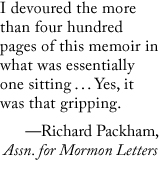It's the 23rd of February, 1987, a Monday, about eight-thirty in the evening. I'm thinking of the Prophet Joseph Smith and trying not to cry when the door to my cell swings open. It's the lady detective.
"Elder Shunn," she says, "I'd like to ask you some questions, if you have a few minutes."
"I'm not going anywhere," I say, brushing roughly at my stinging eyes with the back of my hand.
She drags a plastic chair in from the hallway, a plastic chair like mine, into this tiny room that's more like the soundproof booth on a game show than a jail cell. It's actually not a cell but a consultation room, for suspects and their lawyers, but with no knob on the inside of the door it's all the same. She seals us in and sits down, crosses her legs and smooths her skirt—what perilously little there is of it. She's blonde, maybe twice my age, and from the way she's dressed she must have been working undercover on some street corner when she and her partner got the call to pick me up.
I try not to stare, but the cell is like a closet, so small our knees nearly touch. Except for that officer at the border, I haven't been alone so close to a woman in months, and I must confess: this one's legs are splendid. It's hard not to look, hard not to hunt with my eyes for comfort, for relief from my terror.
She arranges a steno pad on the top of her bare thigh, pencil sharpened and poised. She doesn't seem concerned that I might try to grab the pencil and stab her with it. If she's carrying a gun, I can't spot it, but I don't stop trying.
Relaxed and all business, she says, "Your name, please?"
"You just called me by my name."
"For the record." Her green eyes, flat and frank, never blink. "Full name."
I sniffle a little, try to cover it with a cough, straightening up in my chair. Unconsciously, I touch the spot on my sweater where the black name tag should have been. "Donald William Shunn the Second."
"How old are you?"
"Nineteen."
"Citizenship?"
"American." In the present circumstance, the word tastes somehow dirty.
"And you've been in the country how long?"
"Five months. Give or take."
"Any previous record?"
"No."
She takes sharp, efficient notes in shorthand, a skill I didn't know anyone still had. This mundane detail causes a tide of grief to rise inside me, grief for myself, for my ruined future. Joseph Smith, I tell myself. Think of Joseph Smith. How would he have dealt with this situation?
I almost laugh. With a female jailer? He probably would have sweet-talked his way right out the door, and convinced her to become his thirty-fourth plural wife in the bargain.
"Okay, Elder," she says, crossing her legs the other way, much to my fascination. She's the woman boys like me fantasize about: the authority figure, jaded and direct, carelessly sexy, powerful. The kind you want for your private tutor, your initiation into the club, your Mrs. Robinson. "Let's talk about your activities today."
A confusing dislocation dizzies my head. "But I did this already," I say. "I told the constable at the airport."
She shrugs. "Now you're going to tell me, and you're probably going to tell someone else after that. That's how these things go."
"I want to talk to my mission president," I say, wrapping my arms around my chest.
"So do we, Elder. If it smacks of terrorism, it makes us very curious."
"Terrorism!" The word hits me like the ground rushing up, too big to take in, too big to get around. It leaves me breathless. "What?"
"Terrorism, conspiracy . . ."
"Conspiracy? I didn't conspire about anything!"
She taps her pencil on the steno pad. "Religious fanatics, all these telephone calls—think what it must look like from our point of view, the questions we have to ask."
If I could climb the wall and huddle in a corner of the ceiling, I would. Stunned, I think: I'm going to prison. I think: I'm going to prison, and I'm going to die there.
"I'm not a terrorist," I say, but the words grate like thorny lies in my throat. "I explained what happened."
"Explain it to me," says the lady detective. "Help me out here. We can't get any of your people on the phone. All we have is you. All you have is you. Convince me you're not a bad guy."
I close my eyes, trying to work my frozen lungs. Joseph Smith was in a lot of worse scrapes than this, I tell myself. However bad it gets, it won't get worse than that. How many times was he beaten? How many times was he tarred and feathered? How many nights did he spend cold and hungry, afraid and alone, in damp, rat-infested cells nowhere near as comfortable as this one? What did God tell him in the Liberty Jail, when his prospects couldn't have been more bleak? "If the very jaws of hell shall gape open the mouth wide after thee, know thou, my son, that all these things shall give thee experience, and shall be for thy good."
Be strong, I tell myself. Be tough. Be Joseph Smith.
"Now, Elder Shunn," says the lady detective, "tell me—what brought two young Mormon missionaries out to the airport this afternoon?"
A tear spills down my cheek, electric and cold. "Home," I say: a whisper, an answer, a prayer.
I try not to think about what happened to the prophet in the end.


